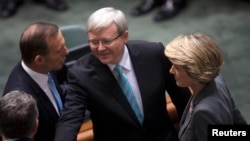SYDNEY —
Australia's former leader, Kevin Rudd, was sworn in Thursday as prime minister, three years after being ousted from the post by Julia Gillard. Among the challenges awaiting the Mandarin-speaking former diplomat are a range of foreign policy issues, including relations with China, and a steady flow of asylum seekers arriving by boat.
In his first term as Australia’s Prime Minister in 2007, Kevin Rudd pursued what many considered a humane and moral approach to refugees. He closed down offshore processing camps in the South Pacific set up by his conservative predecessor. Rights groups criticized conditions inside the facilities, but following Rudd’s removal as leader by Julia Gillard in 2010, the centers in Papua New Guinea and Nauru were reopened to accommodate a steady flow of asylum seekers arriving in Australian waters by sea.
The new prime minister is now being urged to again bring in more compassionate refugee policies.
Labor party lawmaker Doug Cameron says that families with children should not be held under Australia’s mandatory detention policy for asylum seekers.
“I would like to see kids out of camps. I think that is important," he said. "I think we need to get some situation where we can get refugees and asylum seekers actually if they're put into the community, actually having a living, a capacity to make a living. I don't want an underclass created and these are big questions.”
Rudd is a former Australia foreign minister with a particular interest in global affairs. He is a fluent Mandarin speaker, whose daughter is married to a Hong Kong-born banker.
Among the international challenges facing the new Rudd government are relations with Indonesia, a key partner in the fight against radical Islamic terrorism, and commercial ties with China, Australia’s biggest trading partner.
Chinese demand for natural resources, most notably iron ore, has insulated the Australian economy from the ravages of the global recession. But Rudd concedes that the minerals bonanza is coming to an end.
“I believe that what the nation needs now is strong, proven, national economic leadership to deal with the formidable new challenge Australia now faces with the end of the decade-long China resources boom," he said.
Despite his fascination with international affairs, Rudd’s biggest challenges lies at home.
The call for spot elections followed a series of opinion polls that indicated wide public dissatisfaction with the government. Most Labor MPs believe only Rudd can save them from electoral defeat. Thus, one of the new leader’s top priorities is to unite the party and convince voters that a divided government deserves another chance at the next election.
Voting takes place in September, but the campaign promises to be bruising.
In his first term as Australia’s Prime Minister in 2007, Kevin Rudd pursued what many considered a humane and moral approach to refugees. He closed down offshore processing camps in the South Pacific set up by his conservative predecessor. Rights groups criticized conditions inside the facilities, but following Rudd’s removal as leader by Julia Gillard in 2010, the centers in Papua New Guinea and Nauru were reopened to accommodate a steady flow of asylum seekers arriving in Australian waters by sea.
The new prime minister is now being urged to again bring in more compassionate refugee policies.
Labor party lawmaker Doug Cameron says that families with children should not be held under Australia’s mandatory detention policy for asylum seekers.
“I would like to see kids out of camps. I think that is important," he said. "I think we need to get some situation where we can get refugees and asylum seekers actually if they're put into the community, actually having a living, a capacity to make a living. I don't want an underclass created and these are big questions.”
Rudd is a former Australia foreign minister with a particular interest in global affairs. He is a fluent Mandarin speaker, whose daughter is married to a Hong Kong-born banker.
Among the international challenges facing the new Rudd government are relations with Indonesia, a key partner in the fight against radical Islamic terrorism, and commercial ties with China, Australia’s biggest trading partner.
Chinese demand for natural resources, most notably iron ore, has insulated the Australian economy from the ravages of the global recession. But Rudd concedes that the minerals bonanza is coming to an end.
“I believe that what the nation needs now is strong, proven, national economic leadership to deal with the formidable new challenge Australia now faces with the end of the decade-long China resources boom," he said.
Despite his fascination with international affairs, Rudd’s biggest challenges lies at home.
The call for spot elections followed a series of opinion polls that indicated wide public dissatisfaction with the government. Most Labor MPs believe only Rudd can save them from electoral defeat. Thus, one of the new leader’s top priorities is to unite the party and convince voters that a divided government deserves another chance at the next election.
Voting takes place in September, but the campaign promises to be bruising.










